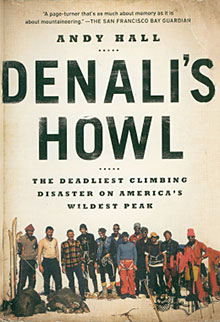
Denali's Howl: The Deadliest Climbing Disaster on America's Wildest Peak By Andy Hall. Penguin Group, New York, NY. ISBN 978-0-14-218195-9
Reviewed by G. David Parris
(To reach Dave, email him at: Email)
As the title suggests, "Denali's Howl" chronicles the "Deadliest Climbing Disaster on America's Wildest Peak". In the summer of 1967, twelve men went up Mount McKinley, but only five came down. This true story is a vivid and gripping book, moving the reader along through even the most minute of details, showing exactly how this tragedy unfolded.
Though he was only five years old at the time, Andy Hall was a witness of sorts. His father was a Mount McKinley National Park Ranger then, and one of the first to get word that things had gone very wrong. His perspective and his father's reflections allow him to weave in and out of the narrative easily and with some authority.
He also draws from the journals of participants on the expedition and rescuers, historical records of weather conditions, National Park Service reports, letters exchanged by all parties, and interviews conducted both by him and others. This to helps weave a narrative both interesting and factual.
Some readers may get bogged down in Hall's sometimes detail-heavy descriptions of the gear carried by the men. The choice here is either to know what the gear is, be willing to learn a little about it, or simply skim those parts in favor of more exciting parts.
There are quite a few exciting parts to look forward to, after all. Those who have even a peripheral awareness of mountaineering and basic winter survival will probably gasp and shake their heads at some choices, while nodding and agreeing with others. As in many such disasters, the gear was as key as the experience levels of participants (or lack thereof). And, of course, the decision-making that revolved around that equipment.
As is almost always the case in outdoor disasters, weather played in heavily. I can't really expand on that without ruining the book, so you'll just have to read it to see what I mean. Another great feature of this book is Hall's openness about the ambiguity between different accounts. When this happens, and it happens often due to all the different people and perspectives involved, he provides as much information about each side or interpretation of events. He will weigh in with what he feels is probably the most likely version of the truth, backing it up with his logic, but without insulting anyone else's perceptions.
If you're interested in a good read, a true story, and an interesting look at this Mount McKinley/Denali bit of tragic history, you'd do well to pick up this book!
Amazon.com: More Information or Purchase
[End of Review]


